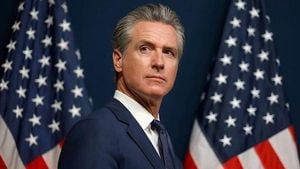The European Central Bank (ECB) has once again made headlines with its decision to cut interest rates, bringing the benchmark deposit rate down to 2.75 percent. This marks the fifth rate cut since June, as central bank officials grapple with the realities of a stagnated Eurozone economy.
ECB President Christine Lagarde stated following the decision on Thursday, "We know the direction of travel -- this is the direction we will take." The statement underscored the urgency felt within the ECB as they try to rejuvenate growth across the Eurozone, which has recently been beset by weak economic performance and rising inflationary pressures.
Recent data revealed the Eurozone economy stagnated at the end of 2024. The gross domestic product (GDP) remained unchanged during the fourth quarter, marking the weakest quarterly performance of the year. Germany and France, two of the Eurozone’s largest economies, experienced slight contractions of 0.2 percent and 0.1 percent respectively, highlighting the systemic issues facing the region.
While inflation had previously prompted aggressive rate hikes to combat sky-high energy and food costs, recent indicators suggested price pressures are easing. Still, inflation rose to 2.4 percent in December, slightly above the ECB's target. This has led to concerns among market observers, who are anxious about the balance central bankers must strike between stimulating growth and preventing runaway inflation.
Lagarde’s warnings about trade tensions reflecting President Donald Trump's protectionist agenda reveal another complicate layer to the current economic environment. She cautioned, "Greater friction in global trade could weigh on euro area growth." This comment indicates the ECB is not only focused on internal economic measures but is also wary of global developments and their potential repercussions.
Economic analysts are largely anticipating more rate cuts, considering Carsten Brzeski from ING remarked, "The ECB looks set to continue the current rate cut circle." These sentiments reflect widespread agreement about the necessity for more accommodative monetary policy to stimulate the struggling Eurozone economy.
The political climate is also adding complexity to the economic outlook. Germany is facing political uncertainty with impending early elections due to the recent collapse of its government, and similar turbulence grips France, where the government changed hands following political upheaval. Analysts, like Jens-Oliver Niklasch from LBBW bank, noted, "It is not yet clear what effect the change in the White House will have," referring to how U.S. policy shifts could influence European economic conditions.
Overall, the ECB’s latest move is indicative of the persistent challenges within the Eurozone. Even as markets encourage the bank to ease monetary restrictions, Lagarde and her team must carefully navigate between safeguarding economic recovery and controlling inflation dynamics. The central bank is expected to maintain this focus as it prepares for future meetings, potentially implementing more cuts to support the already struggling economy. Investors will be watching these developments closely, hoping for signs of recovery as central banks across the globe react to the shifting economic landscapes.



